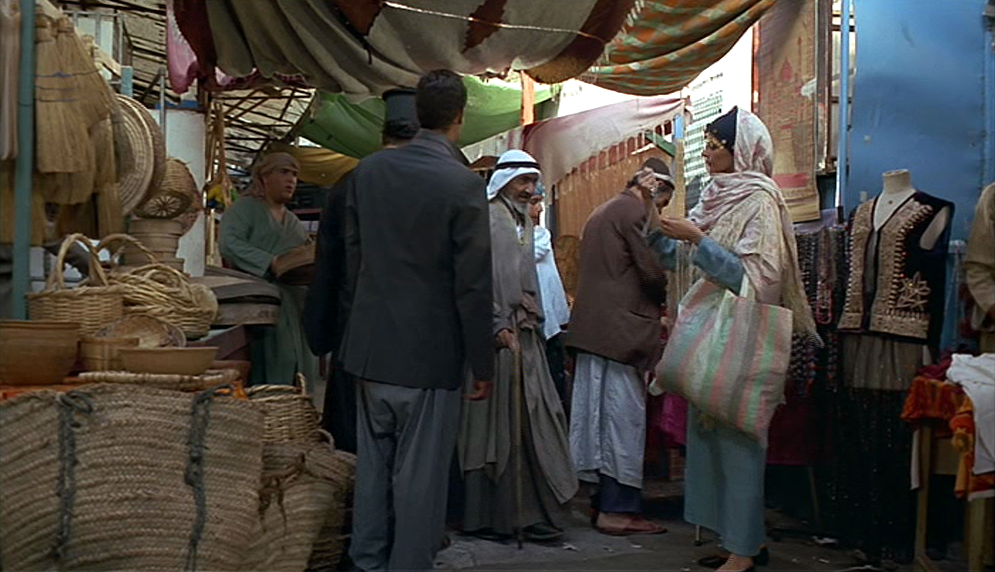(For the original description of the "Architectural Brace" concept, please see the "Exhibition 2" post)
A day at the marketplace. Certainly one of Hooper's most goodhearted, grandiosely demure moments is what prologues the moment of the architectural brace.
The heroine Genie goes to the market with her housekeeper Fatima. Here we see Fatima buying something before turning and walking towards the camera.
She and Genie are to meet half-way. Surreptitiously, our main character is what lies before the camera.
"Genie!"
It is a meeting of the emblems, representing two parties evaluated some granting of grace (graces represented here by a piece of jewelry, a dainty bouquet). Hooper betrays an affection for the provincial by painting the marketplace environs a proper background made up of common pastels - not fetishized in details or made of kitsch highlights. Fatima herself blends into it, not a cheap highlight herself.
A meeting of the emblems half-way, as Genie's miniature bouquet swings into frame before even a sign of her does (symbol prefacing the embodiment), at a shared proximity from Fatima with the camera. The camera, essentially, lies at Genie's side. She walks forward, separating herself from camera and thus meeting Fatima halfway. Almost in response to this separation, the camera begins to gently revolve around the fresh conjoining of the two, now a thing apart from the camera, the camera anyway the orchestrator of this bright burst of coming-together, all this within a crowded marketplace.
In what is a boon of the expedience of film editing, we cut to a close-up of the piece of jewelry in moment of its offering.
"I give... for you."
Genie: "Fatima! You shouldn't have spent your money on me!"
Fatima: "Must have this! Keep away bad! Keep safe!"
Fatima: "Strange country!"
"Strange people!"
Fatima: "I see!"
Genie: "Thank you."
Fatima: "Good. We go now."
In the manner of following (that is, result of mere succession), the sense of adoration for the provincial in this previous moment is, one can see it, simply carried on in the following moment of the architectural brace (even as it also is to suggest the suspicious nature and possible dangerousness of the mysterious man, Mahmoud, who is the forefront of the architectural brace):
"Excuse me! Genie!"
Mahmoud: "Mahmoud? You don't remember me."
Genie: "Of course I remember you."
Mahmoud: "How are you?"
Genie: "Fine. This is our housekeeper, Fatima."
(Mahmoud says an Arabic greeting to her; she only eyes him suspiciously.)
Mahmoud: "So you feeling better?"
Genie: "Much better, thanks to you."
He offers to take them for a drink, bends down to offer help with her bags:
Fatima: "Genie... we go."
Mahmoud backs off, greeted then to a new shot that places him a looming figure, yes, but mostly just a part of the Egyptian town that surrounds him.
Genie: "Guess not."
Mahmoud: "No... I live in a small village... out? In the desert?"
And a small-talk conversation ensues that effectively diminishes the idea of the shot as simply one of a visual of suspicion. It becomes one of the town itself, of cultural placement, of a modern, city-going Egyptian revealing himself actually a provincial one.
Genie: "Why not the city?"
Mahmoud: "Eh... too many people. Too sticky."
"You know, out in the desert, you have real freedom."
"Do you want to see the desert?", the point to which the conversation escalates. Fatima grabs Genie's arm in protest, to which Mahmoud responds with a single Arabic phrase directed at Fatima, which manages to pacify Fatima but puts her no less ill at ease.
After arriving on plans for horse riding in the desert together, Genie and Mahmoud part ways, but Mahmoud and Fatima share one final exchange in their native language, probably some innocuous parting phrase, but moreover an intimation of the world of theirs - the country they've been part of their whole lives before Genie, that has determined their whole current, moral beliefs, that Genie is simply the fresh eyes to cultural and philosophical battles within the borders that have been existing otherwise, even to these, our stand-ins. A language we do not know, a battle for an untouched girl (untouched in regards to ingrained belief systems, that is) that refers to philosophies and religions far older and richer than the movies can tell us, and the provincial landscapes that, in any culture, so often show us both the best and the worst (but always the most essential) of a civilization.











































































No comments:
Post a Comment